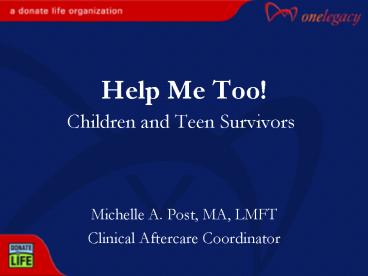Children and Teen Survivors - PowerPoint PPT Presentation
1 / 15
Title:
Children and Teen Survivors
Description:
1 in 5 kids will experience the death of someone close by age 18 ... Task 3: To Adjust to an Environment in Which the Deceased is Missing ... – PowerPoint PPT presentation
Number of Views:50
Avg rating:3.0/5.0
Title: Children and Teen Survivors
1
Help Me Too!
- Children and Teen Survivors
Michelle A. Post, MA, LMFT Clinical Aftercare
Coordinator
2
Question to Run on
- In the moment of the crisis, how can we assess
and assure that support is provided for children
and teens?
3
How We View Kids?
Books to Help Parents/Professionals
Glued to the Tube
Who's Calling the Shots?
Sugar And Spice And No Longer Nice
Wild Child
Not My Kid!
Your Defiant Child
? Passivity
Raising A Moody Child Don't Be Sad
? Why Isn't Johnny Crying?
? Send In The Idiots
Emotional Intelligence
4
How We View Kids?
Books to Help Parents/Professionals
Anxious Children Depressed Children Obsessive
Children Violent Children Overly Attached
Children Ambivalently Attached Children
? Normal Kids Have Problems Too!
5
Outline
- Grief as the Great Equalizer
- How to talk to kids teens
- To involve or not to involve, that is the ?
- Resources
6
Why Grief?
- Why questions are the hardest ones to answer.
- Dr. Alan Wolfelt
7
Everyone is Affected!
If Death is a Universal Truth, Grief
is the Great Equalizer
8
Grief Stats
- Kenneth Doka, Editor of OMEGA Journal
- 1 in 5 kids will experience the death of someone
close by age 18 - 1 in 20 kids will experience the death of a
parent by age 18
9
Grief Stats
- U.S. Dept. of Health Human Services 2004
- 77.9 is average national life expectancy for
those born in 2004 - leading cause of death for average infant was
malformation, 1-44 year old was accidental
injury, age 45-64 was cancer, age 65 was heart
disease - leading cause of death for young black males
15-24 homicide - 2 4 times higher risk of suicide in non-Hispanic
white males than other males
10
Our Philosophy
- Adopted Dr. Alan Wolfelts idea of Responsible
Rebels for bereaved children - We do not function as agents of conformity to
get the child over grief, but instead foster
growth in the child. - Too often we assume that the friends and family
members will support them in their grief journey.
- Parents/siblings can be too overwhelmed.
- Friends project feelings of helplessness by
ignoring the subject entirely. - From Healing the Bereaved Child
11
J. William Wordens 4 Tasks of Mourning
Task 1 To Accept the Reality of the (Death)
Task 2 To Experience the Pain of the (Death)
Task 3 To Adjust to an Environment in
Which the Deceased is Missing
Task 4 To Relocate the Dead Person within Ones
Life and Find Ways to Memorialize
the Person
Adapted from Children Grief When a parent
dies by J. William Worden, Ph.D
12
What to Say Not to Say
Use truthful and clear information to explain the
cause of death.
Avoid using colloquial sayings or religious
explanations, instead use actual terms.
Explain that
the cause of death is not contagious.
Acknowledge and validate their feelings.
Normalize and remember they can
only tolerate grief in spurts.
Reassure them they are not to blame.
Address their fears and anxiety.
Let them know most people
live to be very old, provide limit setting and
consistent discipline, develop a plan about who
will care for them.
Encourage families to continue routine
activities.
Adapted from Children Grief When a parent
dies by J. William Worden, Ph.D
13
To Include or Not to Include?
The Harvard Study Research
The
picture in their head is often worse than what is
real.
Prepare Children Teens for what they will
see, hear, feel and/or smell
Let them make an informed choice.
Include children in all aspects of information
sharing, hospital visits, and family mourning
rituals.
Debrief with them.
Adapted from Children Grief When a parent
dies by J. William Worden, Ph.D
14
Resources
www.nationalallianceofgrievingchildren.org
OneLegacy Aftercare available for staff trainings
Handouts Child Speak for Death Funerals
Child/Teen/Parent Book List My Grief Rights
My Immortal Beloved
15
My Immortal Beloved































